Sustainable Tourism Development
VerifiedAdded on 2020/11/23
|14
|3604
|349
Essay
AI Summary
This assignment examines the crucial role of sustainability in ensuring long-term success for tourism businesses. It highlights how adopting sustainable practices can lead to competitive advantages such as increased community support, cost reductions, and the creation of novel marketing avenues.
Contribute Materials
Your contribution can guide someone’s learning journey. Share your
documents today.
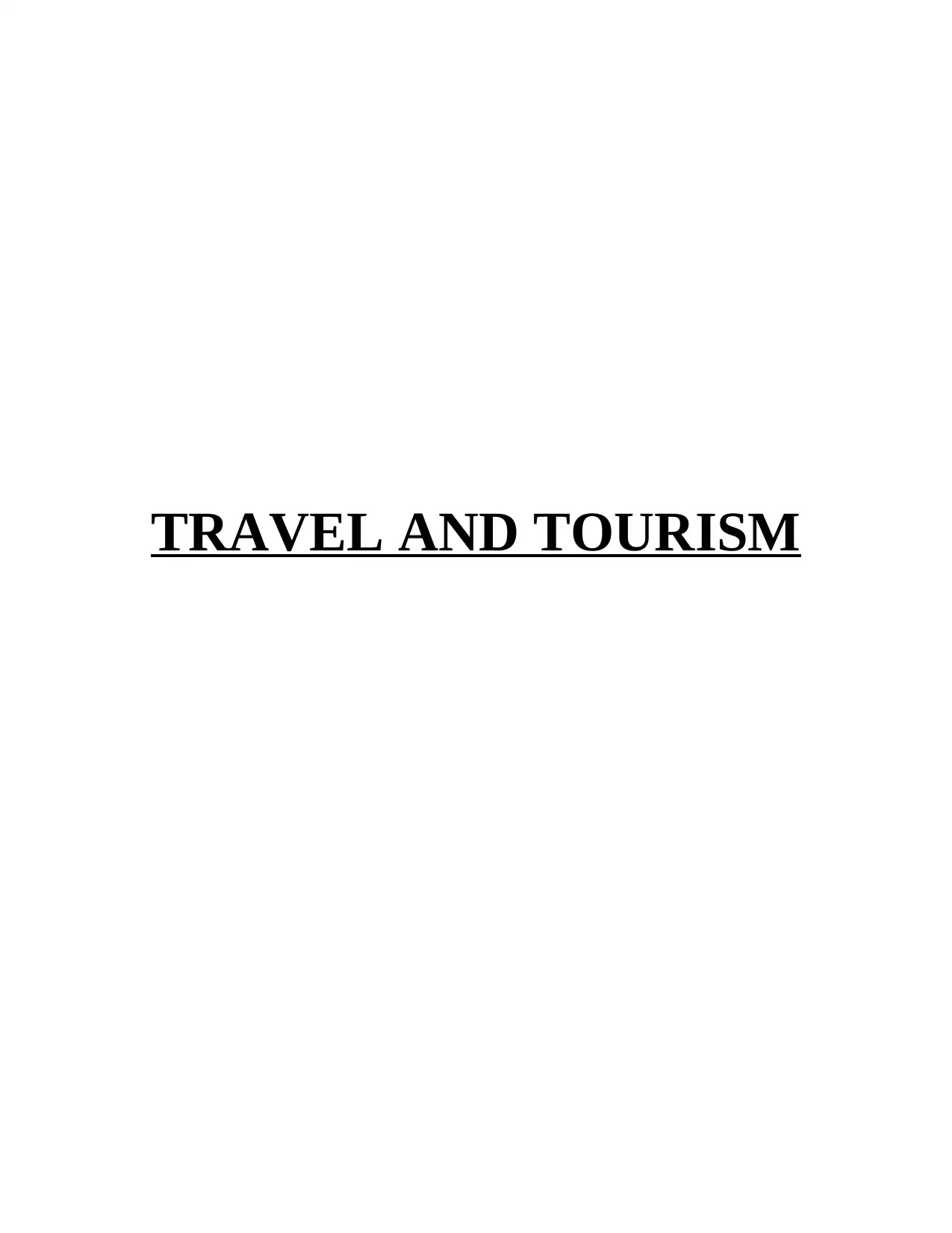
TRAVEL AND TOURISM
Secure Best Marks with AI Grader
Need help grading? Try our AI Grader for instant feedback on your assignments.
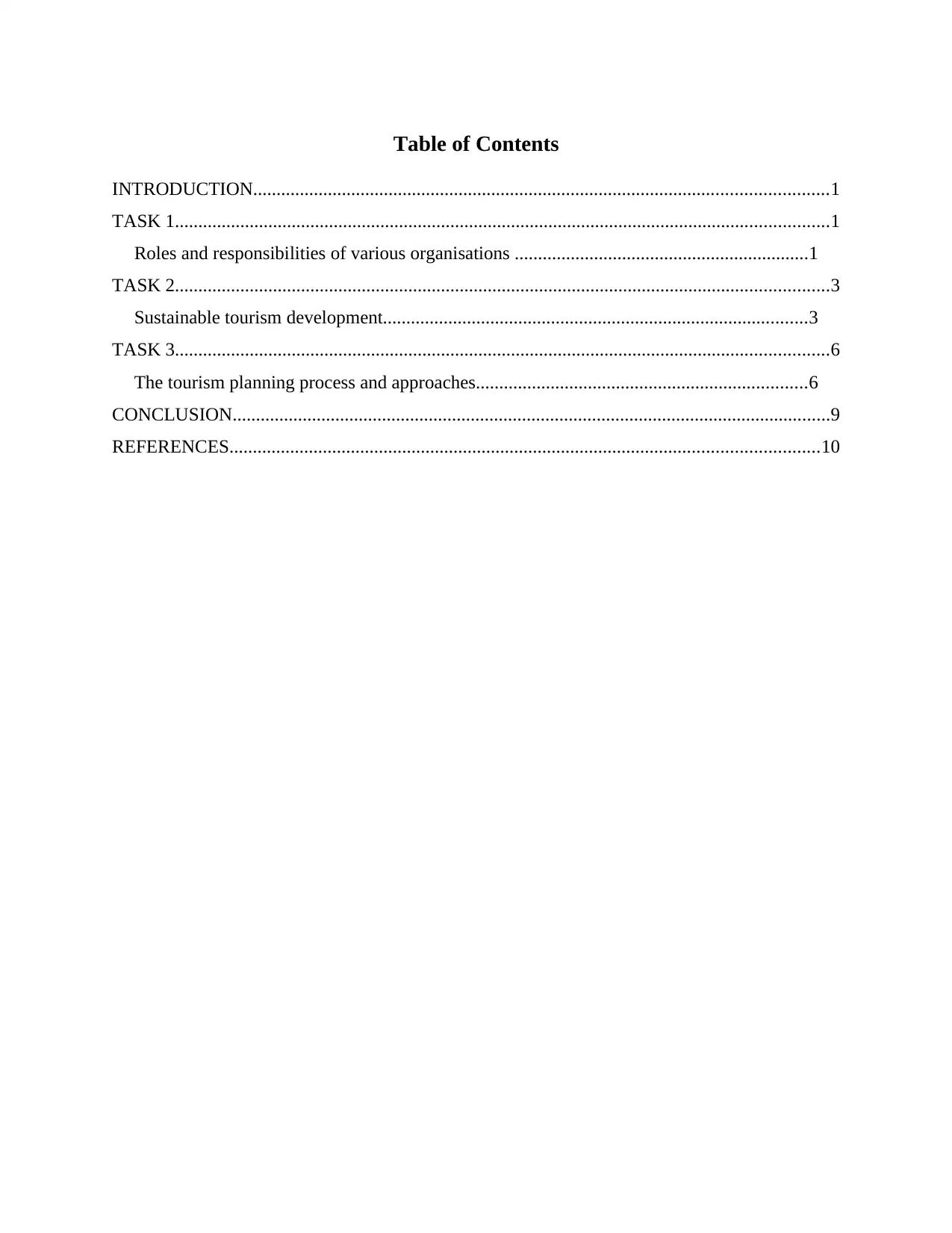
Table of Contents
INTRODUCTION...........................................................................................................................1
TASK 1............................................................................................................................................1
Roles and responsibilities of various organisations ...............................................................1
TASK 2............................................................................................................................................3
Sustainable tourism development...........................................................................................3
TASK 3............................................................................................................................................6
The tourism planning process and approaches.......................................................................6
CONCLUSION................................................................................................................................9
REFERENCES..............................................................................................................................10
INTRODUCTION...........................................................................................................................1
TASK 1............................................................................................................................................1
Roles and responsibilities of various organisations ...............................................................1
TASK 2............................................................................................................................................3
Sustainable tourism development...........................................................................................3
TASK 3............................................................................................................................................6
The tourism planning process and approaches.......................................................................6
CONCLUSION................................................................................................................................9
REFERENCES..............................................................................................................................10

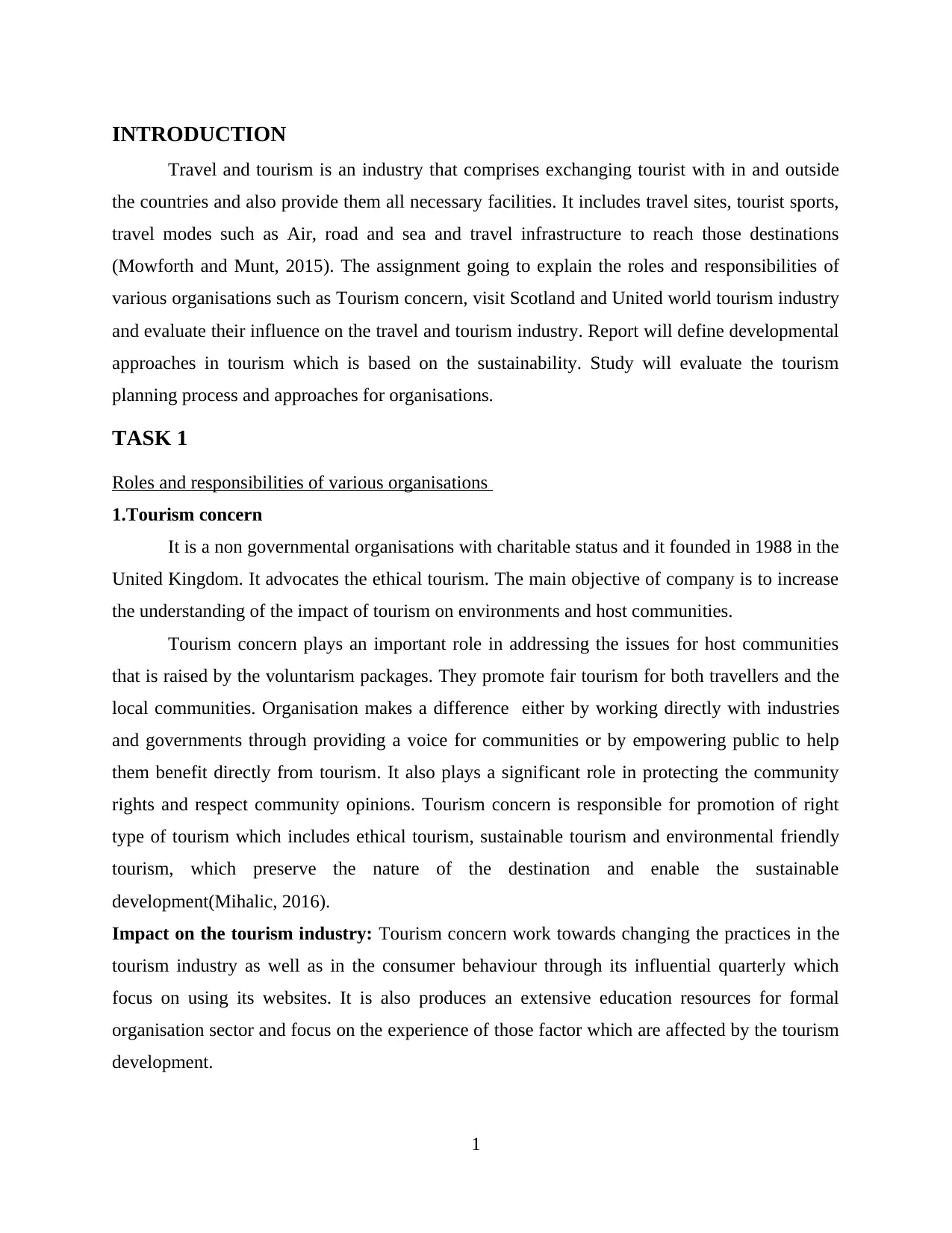
INTRODUCTION
Travel and tourism is an industry that comprises exchanging tourist with in and outside
the countries and also provide them all necessary facilities. It includes travel sites, tourist sports,
travel modes such as Air, road and sea and travel infrastructure to reach those destinations
(Mowforth and Munt, 2015). The assignment going to explain the roles and responsibilities of
various organisations such as Tourism concern, visit Scotland and United world tourism industry
and evaluate their influence on the travel and tourism industry. Report will define developmental
approaches in tourism which is based on the sustainability. Study will evaluate the tourism
planning process and approaches for organisations.
TASK 1
Roles and responsibilities of various organisations
1.Tourism concern
It is a non governmental organisations with charitable status and it founded in 1988 in the
United Kingdom. It advocates the ethical tourism. The main objective of company is to increase
the understanding of the impact of tourism on environments and host communities.
Tourism concern plays an important role in addressing the issues for host communities
that is raised by the voluntarism packages. They promote fair tourism for both travellers and the
local communities. Organisation makes a difference either by working directly with industries
and governments through providing a voice for communities or by empowering public to help
them benefit directly from tourism. It also plays a significant role in protecting the community
rights and respect community opinions. Tourism concern is responsible for promotion of right
type of tourism which includes ethical tourism, sustainable tourism and environmental friendly
tourism, which preserve the nature of the destination and enable the sustainable
development(Mihalic, 2016).
Impact on the tourism industry: Tourism concern work towards changing the practices in the
tourism industry as well as in the consumer behaviour through its influential quarterly which
focus on using its websites. It is also produces an extensive education resources for formal
organisation sector and focus on the experience of those factor which are affected by the tourism
development.
1
Travel and tourism is an industry that comprises exchanging tourist with in and outside
the countries and also provide them all necessary facilities. It includes travel sites, tourist sports,
travel modes such as Air, road and sea and travel infrastructure to reach those destinations
(Mowforth and Munt, 2015). The assignment going to explain the roles and responsibilities of
various organisations such as Tourism concern, visit Scotland and United world tourism industry
and evaluate their influence on the travel and tourism industry. Report will define developmental
approaches in tourism which is based on the sustainability. Study will evaluate the tourism
planning process and approaches for organisations.
TASK 1
Roles and responsibilities of various organisations
1.Tourism concern
It is a non governmental organisations with charitable status and it founded in 1988 in the
United Kingdom. It advocates the ethical tourism. The main objective of company is to increase
the understanding of the impact of tourism on environments and host communities.
Tourism concern plays an important role in addressing the issues for host communities
that is raised by the voluntarism packages. They promote fair tourism for both travellers and the
local communities. Organisation makes a difference either by working directly with industries
and governments through providing a voice for communities or by empowering public to help
them benefit directly from tourism. It also plays a significant role in protecting the community
rights and respect community opinions. Tourism concern is responsible for promotion of right
type of tourism which includes ethical tourism, sustainable tourism and environmental friendly
tourism, which preserve the nature of the destination and enable the sustainable
development(Mihalic, 2016).
Impact on the tourism industry: Tourism concern work towards changing the practices in the
tourism industry as well as in the consumer behaviour through its influential quarterly which
focus on using its websites. It is also produces an extensive education resources for formal
organisation sector and focus on the experience of those factor which are affected by the tourism
development.
1
Paraphrase This Document
Need a fresh take? Get an instant paraphrase of this document with our AI Paraphraser
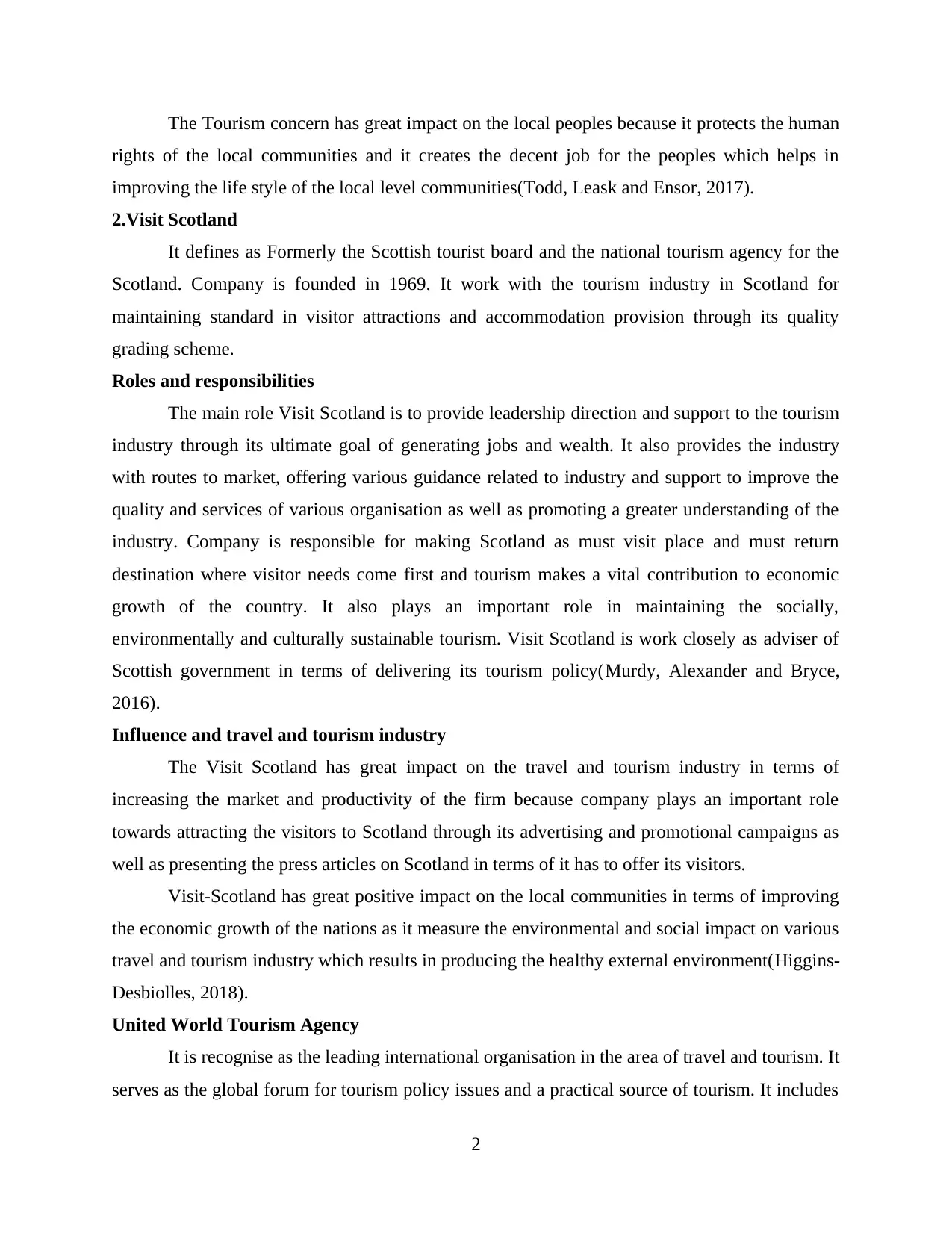
The Tourism concern has great impact on the local peoples because it protects the human
rights of the local communities and it creates the decent job for the peoples which helps in
improving the life style of the local level communities(Todd, Leask and Ensor, 2017).
2.Visit Scotland
It defines as Formerly the Scottish tourist board and the national tourism agency for the
Scotland. Company is founded in 1969. It work with the tourism industry in Scotland for
maintaining standard in visitor attractions and accommodation provision through its quality
grading scheme.
Roles and responsibilities
The main role Visit Scotland is to provide leadership direction and support to the tourism
industry through its ultimate goal of generating jobs and wealth. It also provides the industry
with routes to market, offering various guidance related to industry and support to improve the
quality and services of various organisation as well as promoting a greater understanding of the
industry. Company is responsible for making Scotland as must visit place and must return
destination where visitor needs come first and tourism makes a vital contribution to economic
growth of the country. It also plays an important role in maintaining the socially,
environmentally and culturally sustainable tourism. Visit Scotland is work closely as adviser of
Scottish government in terms of delivering its tourism policy(Murdy, Alexander and Bryce,
2016).
Influence and travel and tourism industry
The Visit Scotland has great impact on the travel and tourism industry in terms of
increasing the market and productivity of the firm because company plays an important role
towards attracting the visitors to Scotland through its advertising and promotional campaigns as
well as presenting the press articles on Scotland in terms of it has to offer its visitors.
Visit-Scotland has great positive impact on the local communities in terms of improving
the economic growth of the nations as it measure the environmental and social impact on various
travel and tourism industry which results in producing the healthy external environment(Higgins-
Desbiolles, 2018).
United World Tourism Agency
It is recognise as the leading international organisation in the area of travel and tourism. It
serves as the global forum for tourism policy issues and a practical source of tourism. It includes
2
rights of the local communities and it creates the decent job for the peoples which helps in
improving the life style of the local level communities(Todd, Leask and Ensor, 2017).
2.Visit Scotland
It defines as Formerly the Scottish tourist board and the national tourism agency for the
Scotland. Company is founded in 1969. It work with the tourism industry in Scotland for
maintaining standard in visitor attractions and accommodation provision through its quality
grading scheme.
Roles and responsibilities
The main role Visit Scotland is to provide leadership direction and support to the tourism
industry through its ultimate goal of generating jobs and wealth. It also provides the industry
with routes to market, offering various guidance related to industry and support to improve the
quality and services of various organisation as well as promoting a greater understanding of the
industry. Company is responsible for making Scotland as must visit place and must return
destination where visitor needs come first and tourism makes a vital contribution to economic
growth of the country. It also plays an important role in maintaining the socially,
environmentally and culturally sustainable tourism. Visit Scotland is work closely as adviser of
Scottish government in terms of delivering its tourism policy(Murdy, Alexander and Bryce,
2016).
Influence and travel and tourism industry
The Visit Scotland has great impact on the travel and tourism industry in terms of
increasing the market and productivity of the firm because company plays an important role
towards attracting the visitors to Scotland through its advertising and promotional campaigns as
well as presenting the press articles on Scotland in terms of it has to offer its visitors.
Visit-Scotland has great positive impact on the local communities in terms of improving
the economic growth of the nations as it measure the environmental and social impact on various
travel and tourism industry which results in producing the healthy external environment(Higgins-
Desbiolles, 2018).
United World Tourism Agency
It is recognise as the leading international organisation in the area of travel and tourism. It
serves as the global forum for tourism policy issues and a practical source of tourism. It includes
2
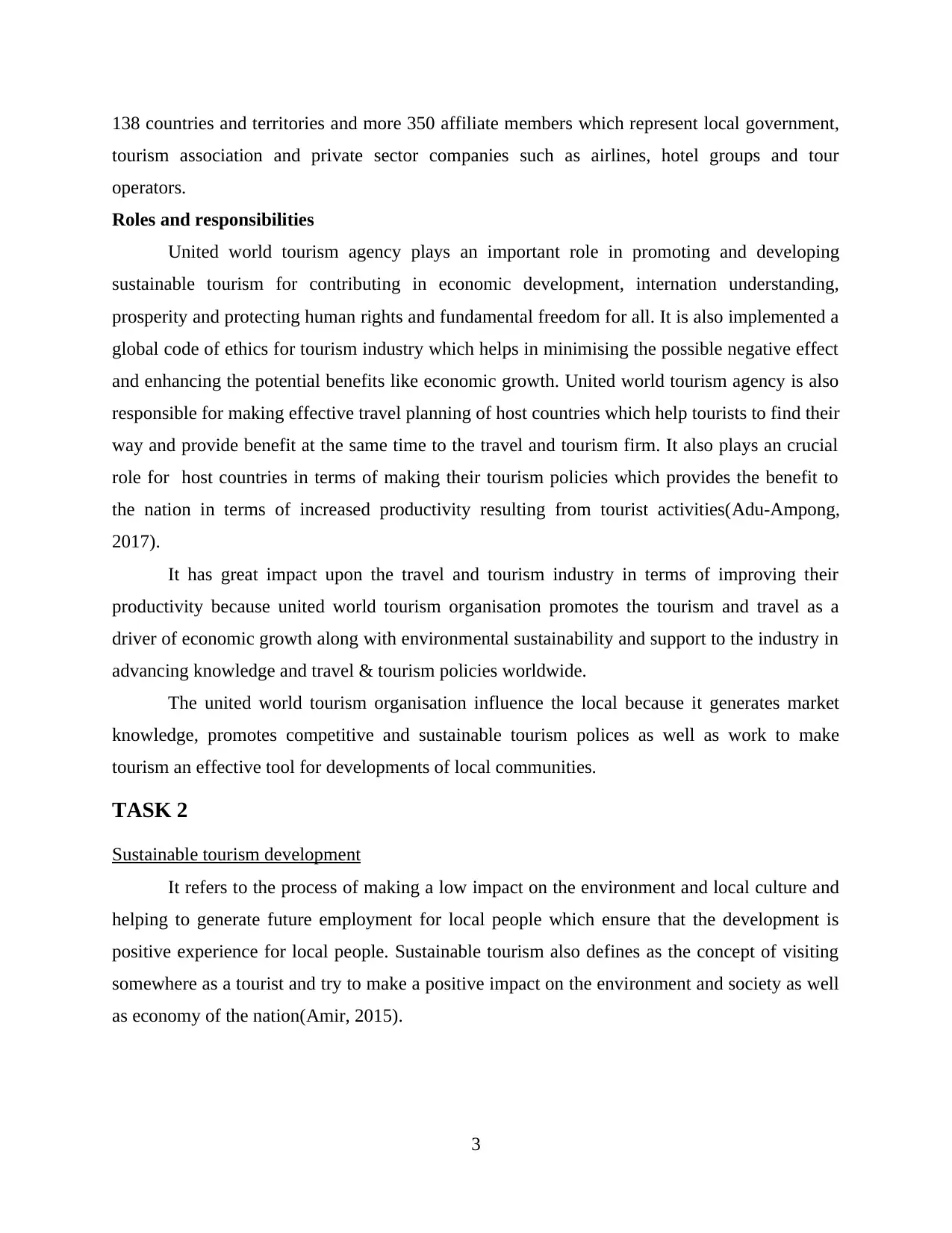
138 countries and territories and more 350 affiliate members which represent local government,
tourism association and private sector companies such as airlines, hotel groups and tour
operators.
Roles and responsibilities
United world tourism agency plays an important role in promoting and developing
sustainable tourism for contributing in economic development, internation understanding,
prosperity and protecting human rights and fundamental freedom for all. It is also implemented a
global code of ethics for tourism industry which helps in minimising the possible negative effect
and enhancing the potential benefits like economic growth. United world tourism agency is also
responsible for making effective travel planning of host countries which help tourists to find their
way and provide benefit at the same time to the travel and tourism firm. It also plays an crucial
role for host countries in terms of making their tourism policies which provides the benefit to
the nation in terms of increased productivity resulting from tourist activities(Adu-Ampong,
2017).
It has great impact upon the travel and tourism industry in terms of improving their
productivity because united world tourism organisation promotes the tourism and travel as a
driver of economic growth along with environmental sustainability and support to the industry in
advancing knowledge and travel & tourism policies worldwide.
The united world tourism organisation influence the local because it generates market
knowledge, promotes competitive and sustainable tourism polices as well as work to make
tourism an effective tool for developments of local communities.
TASK 2
Sustainable tourism development
It refers to the process of making a low impact on the environment and local culture and
helping to generate future employment for local people which ensure that the development is
positive experience for local people. Sustainable tourism also defines as the concept of visiting
somewhere as a tourist and try to make a positive impact on the environment and society as well
as economy of the nation(Amir, 2015).
3
tourism association and private sector companies such as airlines, hotel groups and tour
operators.
Roles and responsibilities
United world tourism agency plays an important role in promoting and developing
sustainable tourism for contributing in economic development, internation understanding,
prosperity and protecting human rights and fundamental freedom for all. It is also implemented a
global code of ethics for tourism industry which helps in minimising the possible negative effect
and enhancing the potential benefits like economic growth. United world tourism agency is also
responsible for making effective travel planning of host countries which help tourists to find their
way and provide benefit at the same time to the travel and tourism firm. It also plays an crucial
role for host countries in terms of making their tourism policies which provides the benefit to
the nation in terms of increased productivity resulting from tourist activities(Adu-Ampong,
2017).
It has great impact upon the travel and tourism industry in terms of improving their
productivity because united world tourism organisation promotes the tourism and travel as a
driver of economic growth along with environmental sustainability and support to the industry in
advancing knowledge and travel & tourism policies worldwide.
The united world tourism organisation influence the local because it generates market
knowledge, promotes competitive and sustainable tourism polices as well as work to make
tourism an effective tool for developments of local communities.
TASK 2
Sustainable tourism development
It refers to the process of making a low impact on the environment and local culture and
helping to generate future employment for local people which ensure that the development is
positive experience for local people. Sustainable tourism also defines as the concept of visiting
somewhere as a tourist and try to make a positive impact on the environment and society as well
as economy of the nation(Amir, 2015).
3
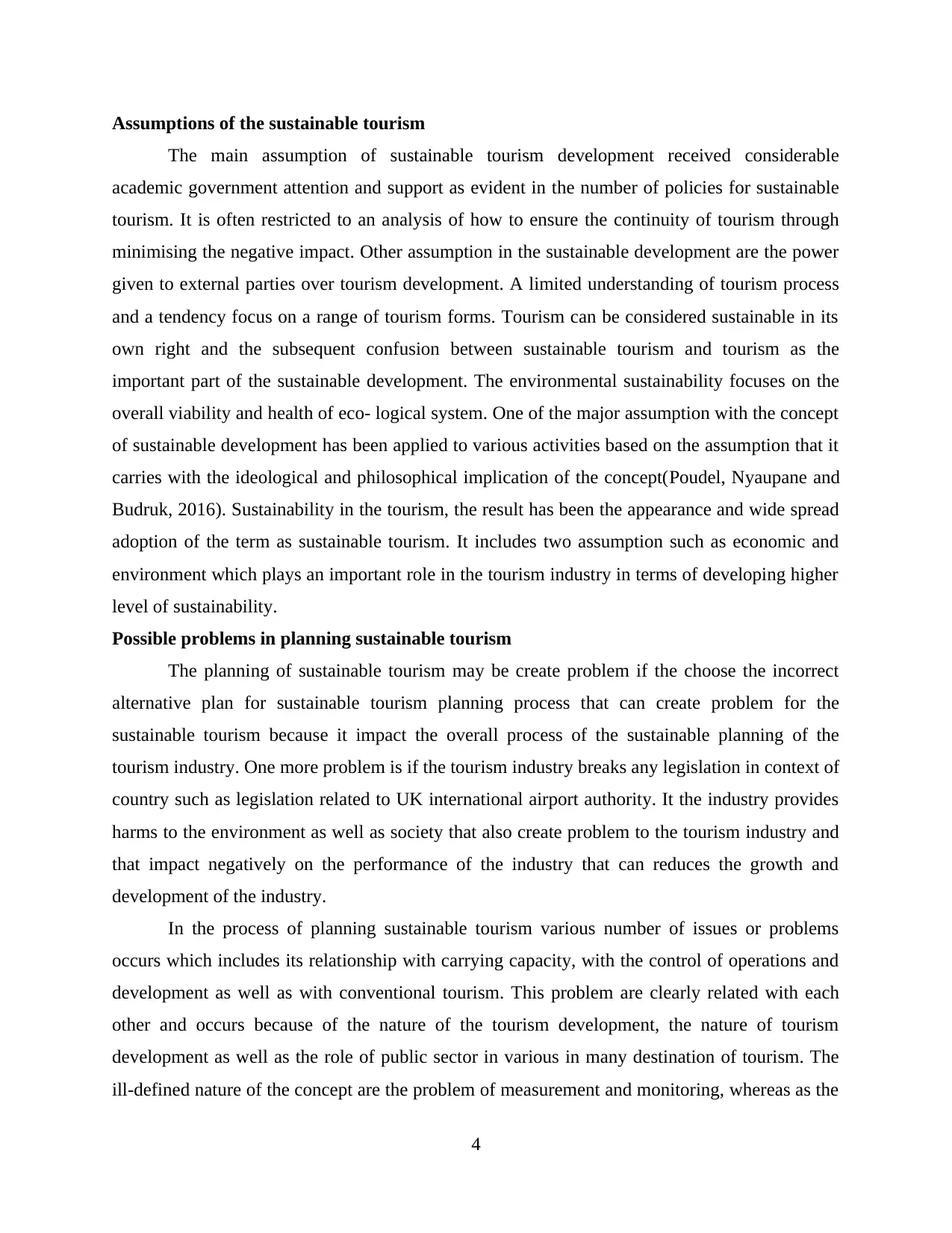
Assumptions of the sustainable tourism
The main assumption of sustainable tourism development received considerable
academic government attention and support as evident in the number of policies for sustainable
tourism. It is often restricted to an analysis of how to ensure the continuity of tourism through
minimising the negative impact. Other assumption in the sustainable development are the power
given to external parties over tourism development. A limited understanding of tourism process
and a tendency focus on a range of tourism forms. Tourism can be considered sustainable in its
own right and the subsequent confusion between sustainable tourism and tourism as the
important part of the sustainable development. The environmental sustainability focuses on the
overall viability and health of eco- logical system. One of the major assumption with the concept
of sustainable development has been applied to various activities based on the assumption that it
carries with the ideological and philosophical implication of the concept(Poudel, Nyaupane and
Budruk, 2016). Sustainability in the tourism, the result has been the appearance and wide spread
adoption of the term as sustainable tourism. It includes two assumption such as economic and
environment which plays an important role in the tourism industry in terms of developing higher
level of sustainability.
Possible problems in planning sustainable tourism
The planning of sustainable tourism may be create problem if the choose the incorrect
alternative plan for sustainable tourism planning process that can create problem for the
sustainable tourism because it impact the overall process of the sustainable planning of the
tourism industry. One more problem is if the tourism industry breaks any legislation in context of
country such as legislation related to UK international airport authority. It the industry provides
harms to the environment as well as society that also create problem to the tourism industry and
that impact negatively on the performance of the industry that can reduces the growth and
development of the industry.
In the process of planning sustainable tourism various number of issues or problems
occurs which includes its relationship with carrying capacity, with the control of operations and
development as well as with conventional tourism. This problem are clearly related with each
other and occurs because of the nature of the tourism development, the nature of tourism
development as well as the role of public sector in various in many destination of tourism. The
ill-defined nature of the concept are the problem of measurement and monitoring, whereas as the
4
The main assumption of sustainable tourism development received considerable
academic government attention and support as evident in the number of policies for sustainable
tourism. It is often restricted to an analysis of how to ensure the continuity of tourism through
minimising the negative impact. Other assumption in the sustainable development are the power
given to external parties over tourism development. A limited understanding of tourism process
and a tendency focus on a range of tourism forms. Tourism can be considered sustainable in its
own right and the subsequent confusion between sustainable tourism and tourism as the
important part of the sustainable development. The environmental sustainability focuses on the
overall viability and health of eco- logical system. One of the major assumption with the concept
of sustainable development has been applied to various activities based on the assumption that it
carries with the ideological and philosophical implication of the concept(Poudel, Nyaupane and
Budruk, 2016). Sustainability in the tourism, the result has been the appearance and wide spread
adoption of the term as sustainable tourism. It includes two assumption such as economic and
environment which plays an important role in the tourism industry in terms of developing higher
level of sustainability.
Possible problems in planning sustainable tourism
The planning of sustainable tourism may be create problem if the choose the incorrect
alternative plan for sustainable tourism planning process that can create problem for the
sustainable tourism because it impact the overall process of the sustainable planning of the
tourism industry. One more problem is if the tourism industry breaks any legislation in context of
country such as legislation related to UK international airport authority. It the industry provides
harms to the environment as well as society that also create problem to the tourism industry and
that impact negatively on the performance of the industry that can reduces the growth and
development of the industry.
In the process of planning sustainable tourism various number of issues or problems
occurs which includes its relationship with carrying capacity, with the control of operations and
development as well as with conventional tourism. This problem are clearly related with each
other and occurs because of the nature of the tourism development, the nature of tourism
development as well as the role of public sector in various in many destination of tourism. The
ill-defined nature of the concept are the problem of measurement and monitoring, whereas as the
4
Secure Best Marks with AI Grader
Need help grading? Try our AI Grader for instant feedback on your assignments.
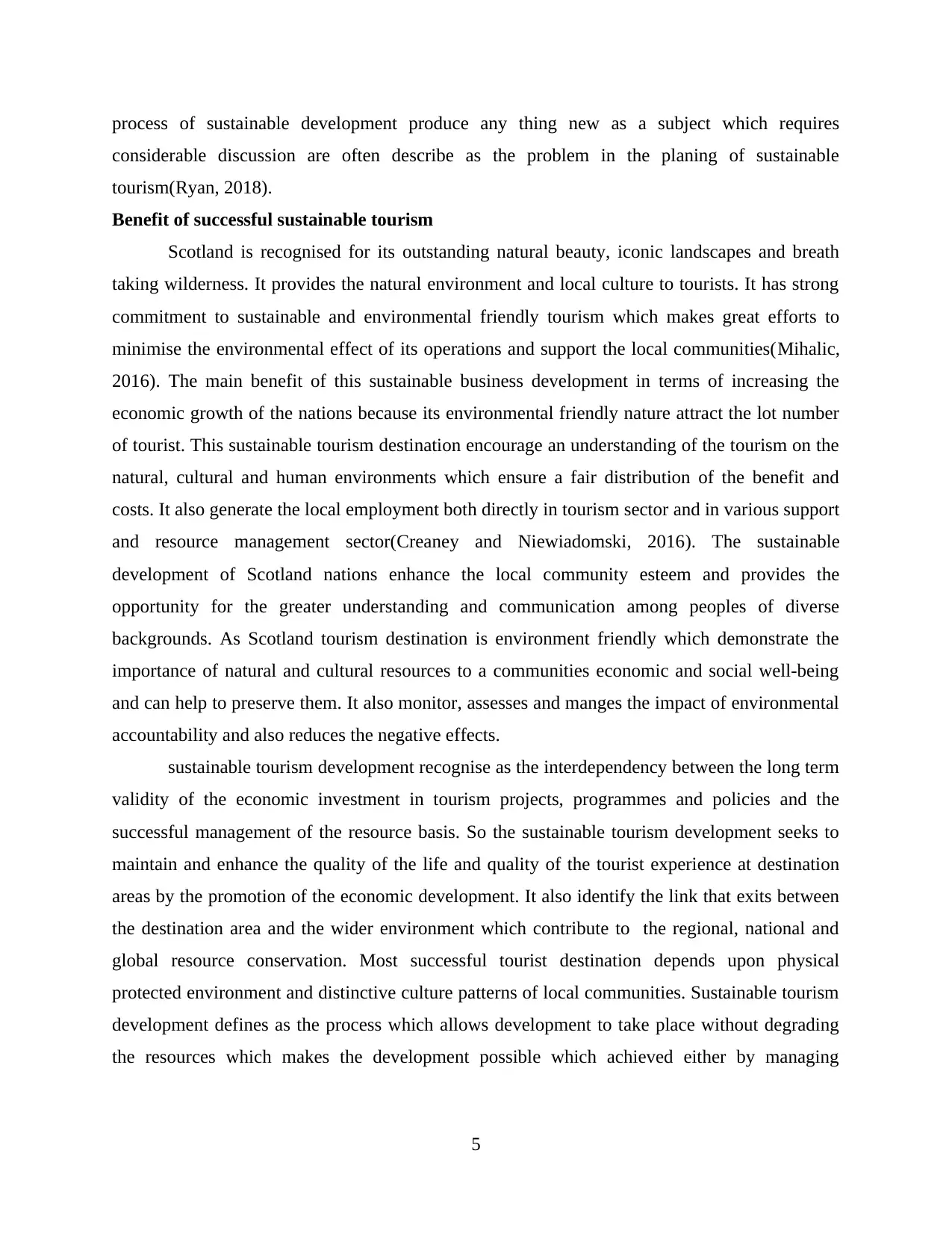
process of sustainable development produce any thing new as a subject which requires
considerable discussion are often describe as the problem in the planing of sustainable
tourism(Ryan, 2018).
Benefit of successful sustainable tourism
Scotland is recognised for its outstanding natural beauty, iconic landscapes and breath
taking wilderness. It provides the natural environment and local culture to tourists. It has strong
commitment to sustainable and environmental friendly tourism which makes great efforts to
minimise the environmental effect of its operations and support the local communities(Mihalic,
2016). The main benefit of this sustainable business development in terms of increasing the
economic growth of the nations because its environmental friendly nature attract the lot number
of tourist. This sustainable tourism destination encourage an understanding of the tourism on the
natural, cultural and human environments which ensure a fair distribution of the benefit and
costs. It also generate the local employment both directly in tourism sector and in various support
and resource management sector(Creaney and Niewiadomski, 2016). The sustainable
development of Scotland nations enhance the local community esteem and provides the
opportunity for the greater understanding and communication among peoples of diverse
backgrounds. As Scotland tourism destination is environment friendly which demonstrate the
importance of natural and cultural resources to a communities economic and social well-being
and can help to preserve them. It also monitor, assesses and manges the impact of environmental
accountability and also reduces the negative effects.
sustainable tourism development recognise as the interdependency between the long term
validity of the economic investment in tourism projects, programmes and policies and the
successful management of the resource basis. So the sustainable tourism development seeks to
maintain and enhance the quality of the life and quality of the tourist experience at destination
areas by the promotion of the economic development. It also identify the link that exits between
the destination area and the wider environment which contribute to the regional, national and
global resource conservation. Most successful tourist destination depends upon physical
protected environment and distinctive culture patterns of local communities. Sustainable tourism
development defines as the process which allows development to take place without degrading
the resources which makes the development possible which achieved either by managing
5
considerable discussion are often describe as the problem in the planing of sustainable
tourism(Ryan, 2018).
Benefit of successful sustainable tourism
Scotland is recognised for its outstanding natural beauty, iconic landscapes and breath
taking wilderness. It provides the natural environment and local culture to tourists. It has strong
commitment to sustainable and environmental friendly tourism which makes great efforts to
minimise the environmental effect of its operations and support the local communities(Mihalic,
2016). The main benefit of this sustainable business development in terms of increasing the
economic growth of the nations because its environmental friendly nature attract the lot number
of tourist. This sustainable tourism destination encourage an understanding of the tourism on the
natural, cultural and human environments which ensure a fair distribution of the benefit and
costs. It also generate the local employment both directly in tourism sector and in various support
and resource management sector(Creaney and Niewiadomski, 2016). The sustainable
development of Scotland nations enhance the local community esteem and provides the
opportunity for the greater understanding and communication among peoples of diverse
backgrounds. As Scotland tourism destination is environment friendly which demonstrate the
importance of natural and cultural resources to a communities economic and social well-being
and can help to preserve them. It also monitor, assesses and manges the impact of environmental
accountability and also reduces the negative effects.
sustainable tourism development recognise as the interdependency between the long term
validity of the economic investment in tourism projects, programmes and policies and the
successful management of the resource basis. So the sustainable tourism development seeks to
maintain and enhance the quality of the life and quality of the tourist experience at destination
areas by the promotion of the economic development. It also identify the link that exits between
the destination area and the wider environment which contribute to the regional, national and
global resource conservation. Most successful tourist destination depends upon physical
protected environment and distinctive culture patterns of local communities. Sustainable tourism
development defines as the process which allows development to take place without degrading
the resources which makes the development possible which achieved either by managing
5
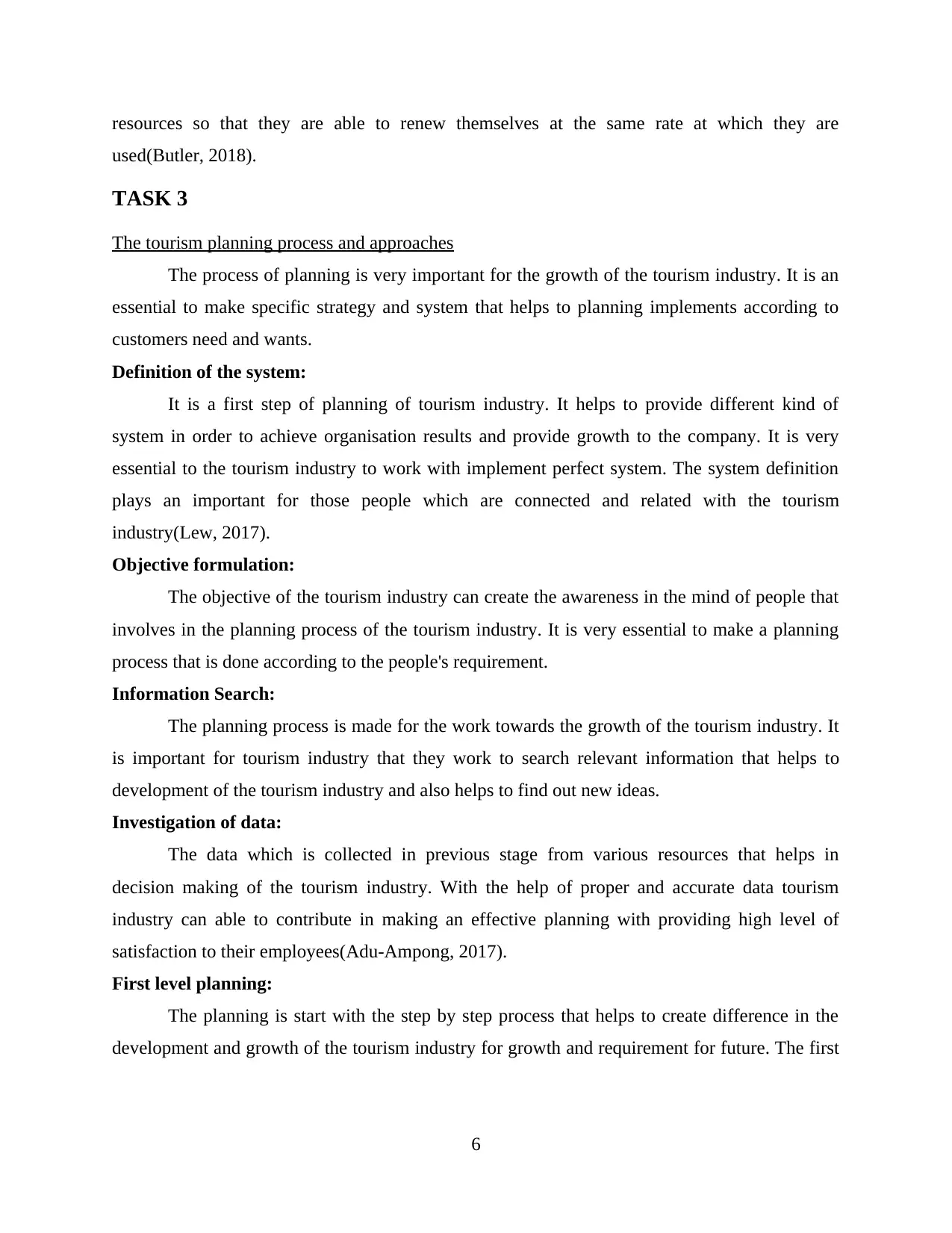
resources so that they are able to renew themselves at the same rate at which they are
used(Butler, 2018).
TASK 3
The tourism planning process and approaches
The process of planning is very important for the growth of the tourism industry. It is an
essential to make specific strategy and system that helps to planning implements according to
customers need and wants.
Definition of the system:
It is a first step of planning of tourism industry. It helps to provide different kind of
system in order to achieve organisation results and provide growth to the company. It is very
essential to the tourism industry to work with implement perfect system. The system definition
plays an important for those people which are connected and related with the tourism
industry(Lew, 2017).
Objective formulation:
The objective of the tourism industry can create the awareness in the mind of people that
involves in the planning process of the tourism industry. It is very essential to make a planning
process that is done according to the people's requirement.
Information Search:
The planning process is made for the work towards the growth of the tourism industry. It
is important for tourism industry that they work to search relevant information that helps to
development of the tourism industry and also helps to find out new ideas.
Investigation of data:
The data which is collected in previous stage from various resources that helps in
decision making of the tourism industry. With the help of proper and accurate data tourism
industry can able to contribute in making an effective planning with providing high level of
satisfaction to their employees(Adu-Ampong, 2017).
First level planning:
The planning is start with the step by step process that helps to create difference in the
development and growth of the tourism industry for growth and requirement for future. The first
6
used(Butler, 2018).
TASK 3
The tourism planning process and approaches
The process of planning is very important for the growth of the tourism industry. It is an
essential to make specific strategy and system that helps to planning implements according to
customers need and wants.
Definition of the system:
It is a first step of planning of tourism industry. It helps to provide different kind of
system in order to achieve organisation results and provide growth to the company. It is very
essential to the tourism industry to work with implement perfect system. The system definition
plays an important for those people which are connected and related with the tourism
industry(Lew, 2017).
Objective formulation:
The objective of the tourism industry can create the awareness in the mind of people that
involves in the planning process of the tourism industry. It is very essential to make a planning
process that is done according to the people's requirement.
Information Search:
The planning process is made for the work towards the growth of the tourism industry. It
is important for tourism industry that they work to search relevant information that helps to
development of the tourism industry and also helps to find out new ideas.
Investigation of data:
The data which is collected in previous stage from various resources that helps in
decision making of the tourism industry. With the help of proper and accurate data tourism
industry can able to contribute in making an effective planning with providing high level of
satisfaction to their employees(Adu-Ampong, 2017).
First level planning:
The planning is start with the step by step process that helps to create difference in the
development and growth of the tourism industry for growth and requirement for future. The first
6
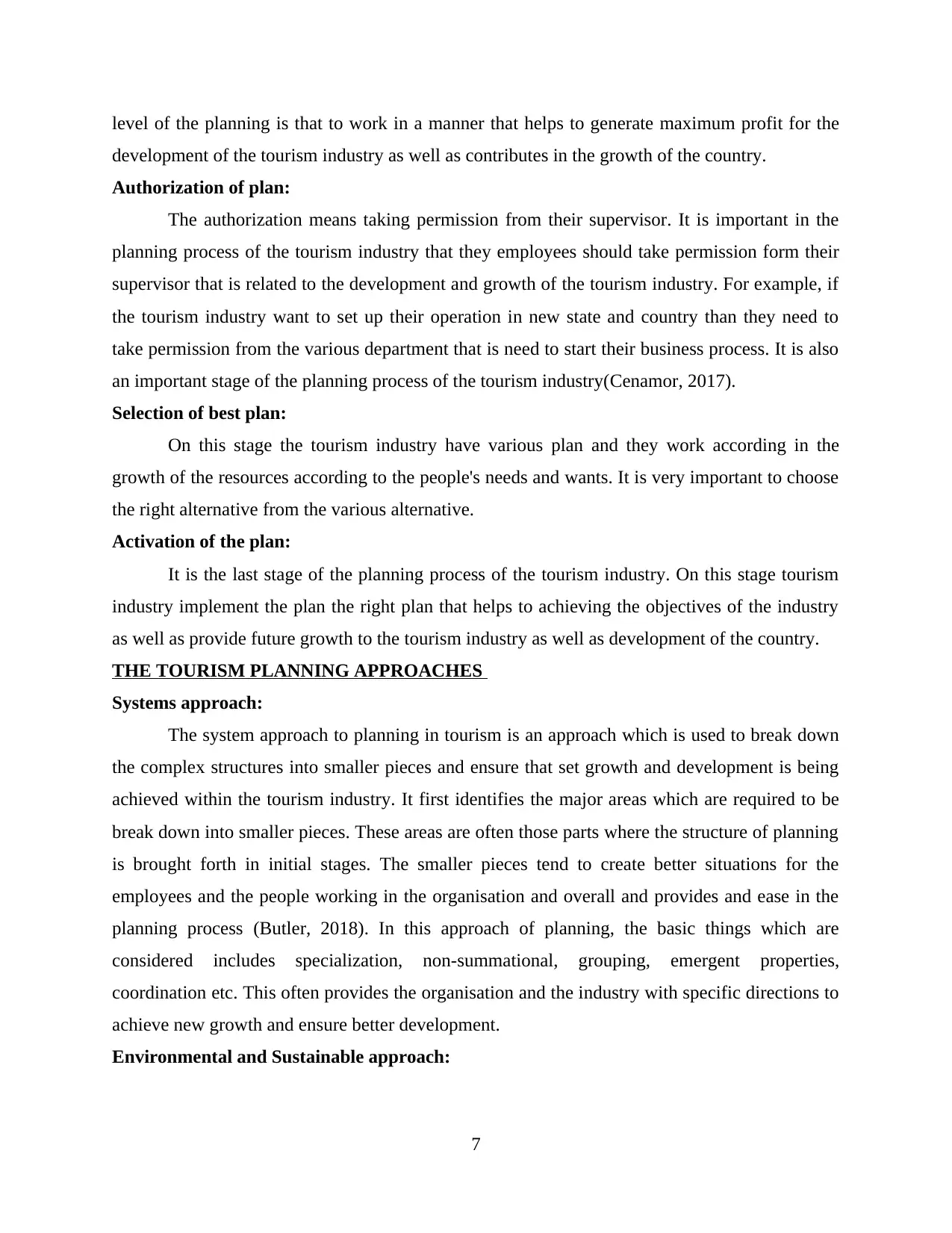
level of the planning is that to work in a manner that helps to generate maximum profit for the
development of the tourism industry as well as contributes in the growth of the country.
Authorization of plan:
The authorization means taking permission from their supervisor. It is important in the
planning process of the tourism industry that they employees should take permission form their
supervisor that is related to the development and growth of the tourism industry. For example, if
the tourism industry want to set up their operation in new state and country than they need to
take permission from the various department that is need to start their business process. It is also
an important stage of the planning process of the tourism industry(Cenamor, 2017).
Selection of best plan:
On this stage the tourism industry have various plan and they work according in the
growth of the resources according to the people's needs and wants. It is very important to choose
the right alternative from the various alternative.
Activation of the plan:
It is the last stage of the planning process of the tourism industry. On this stage tourism
industry implement the plan the right plan that helps to achieving the objectives of the industry
as well as provide future growth to the tourism industry as well as development of the country.
THE TOURISM PLANNING APPROACHES
Systems approach:
The system approach to planning in tourism is an approach which is used to break down
the complex structures into smaller pieces and ensure that set growth and development is being
achieved within the tourism industry. It first identifies the major areas which are required to be
break down into smaller pieces. These areas are often those parts where the structure of planning
is brought forth in initial stages. The smaller pieces tend to create better situations for the
employees and the people working in the organisation and overall and provides and ease in the
planning process (Butler, 2018). In this approach of planning, the basic things which are
considered includes specialization, non-summational, grouping, emergent properties,
coordination etc. This often provides the organisation and the industry with specific directions to
achieve new growth and ensure better development.
Environmental and Sustainable approach:
7
development of the tourism industry as well as contributes in the growth of the country.
Authorization of plan:
The authorization means taking permission from their supervisor. It is important in the
planning process of the tourism industry that they employees should take permission form their
supervisor that is related to the development and growth of the tourism industry. For example, if
the tourism industry want to set up their operation in new state and country than they need to
take permission from the various department that is need to start their business process. It is also
an important stage of the planning process of the tourism industry(Cenamor, 2017).
Selection of best plan:
On this stage the tourism industry have various plan and they work according in the
growth of the resources according to the people's needs and wants. It is very important to choose
the right alternative from the various alternative.
Activation of the plan:
It is the last stage of the planning process of the tourism industry. On this stage tourism
industry implement the plan the right plan that helps to achieving the objectives of the industry
as well as provide future growth to the tourism industry as well as development of the country.
THE TOURISM PLANNING APPROACHES
Systems approach:
The system approach to planning in tourism is an approach which is used to break down
the complex structures into smaller pieces and ensure that set growth and development is being
achieved within the tourism industry. It first identifies the major areas which are required to be
break down into smaller pieces. These areas are often those parts where the structure of planning
is brought forth in initial stages. The smaller pieces tend to create better situations for the
employees and the people working in the organisation and overall and provides and ease in the
planning process (Butler, 2018). In this approach of planning, the basic things which are
considered includes specialization, non-summational, grouping, emergent properties,
coordination etc. This often provides the organisation and the industry with specific directions to
achieve new growth and ensure better development.
Environmental and Sustainable approach:
7
Paraphrase This Document
Need a fresh take? Get an instant paraphrase of this document with our AI Paraphraser
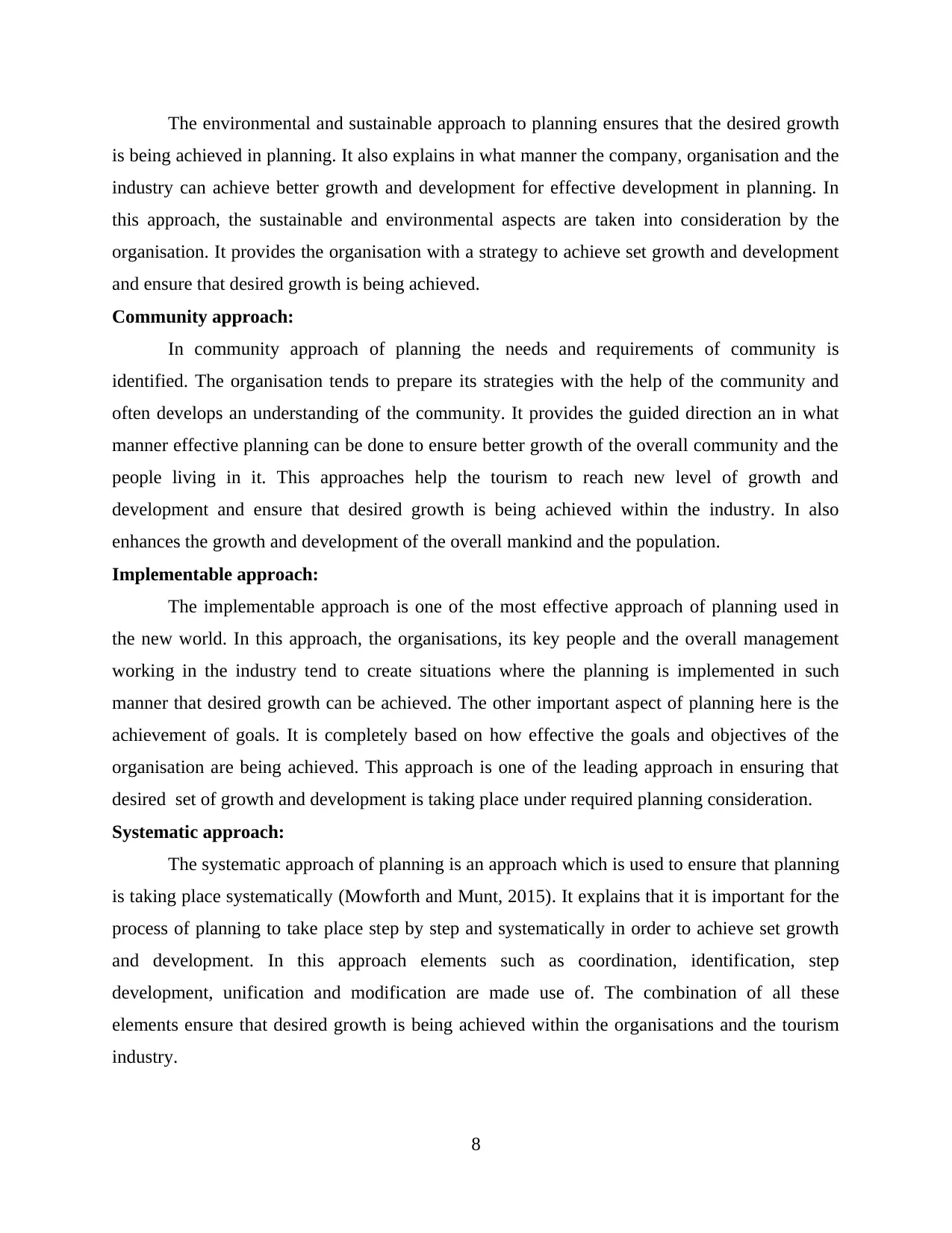
The environmental and sustainable approach to planning ensures that the desired growth
is being achieved in planning. It also explains in what manner the company, organisation and the
industry can achieve better growth and development for effective development in planning. In
this approach, the sustainable and environmental aspects are taken into consideration by the
organisation. It provides the organisation with a strategy to achieve set growth and development
and ensure that desired growth is being achieved.
Community approach:
In community approach of planning the needs and requirements of community is
identified. The organisation tends to prepare its strategies with the help of the community and
often develops an understanding of the community. It provides the guided direction an in what
manner effective planning can be done to ensure better growth of the overall community and the
people living in it. This approaches help the tourism to reach new level of growth and
development and ensure that desired growth is being achieved within the industry. In also
enhances the growth and development of the overall mankind and the population.
Implementable approach:
The implementable approach is one of the most effective approach of planning used in
the new world. In this approach, the organisations, its key people and the overall management
working in the industry tend to create situations where the planning is implemented in such
manner that desired growth can be achieved. The other important aspect of planning here is the
achievement of goals. It is completely based on how effective the goals and objectives of the
organisation are being achieved. This approach is one of the leading approach in ensuring that
desired set of growth and development is taking place under required planning consideration.
Systematic approach:
The systematic approach of planning is an approach which is used to ensure that planning
is taking place systematically (Mowforth and Munt, 2015). It explains that it is important for the
process of planning to take place step by step and systematically in order to achieve set growth
and development. In this approach elements such as coordination, identification, step
development, unification and modification are made use of. The combination of all these
elements ensure that desired growth is being achieved within the organisations and the tourism
industry.
8
is being achieved in planning. It also explains in what manner the company, organisation and the
industry can achieve better growth and development for effective development in planning. In
this approach, the sustainable and environmental aspects are taken into consideration by the
organisation. It provides the organisation with a strategy to achieve set growth and development
and ensure that desired growth is being achieved.
Community approach:
In community approach of planning the needs and requirements of community is
identified. The organisation tends to prepare its strategies with the help of the community and
often develops an understanding of the community. It provides the guided direction an in what
manner effective planning can be done to ensure better growth of the overall community and the
people living in it. This approaches help the tourism to reach new level of growth and
development and ensure that desired growth is being achieved within the industry. In also
enhances the growth and development of the overall mankind and the population.
Implementable approach:
The implementable approach is one of the most effective approach of planning used in
the new world. In this approach, the organisations, its key people and the overall management
working in the industry tend to create situations where the planning is implemented in such
manner that desired growth can be achieved. The other important aspect of planning here is the
achievement of goals. It is completely based on how effective the goals and objectives of the
organisation are being achieved. This approach is one of the leading approach in ensuring that
desired set of growth and development is taking place under required planning consideration.
Systematic approach:
The systematic approach of planning is an approach which is used to ensure that planning
is taking place systematically (Mowforth and Munt, 2015). It explains that it is important for the
process of planning to take place step by step and systematically in order to achieve set growth
and development. In this approach elements such as coordination, identification, step
development, unification and modification are made use of. The combination of all these
elements ensure that desired growth is being achieved within the organisations and the tourism
industry.
8
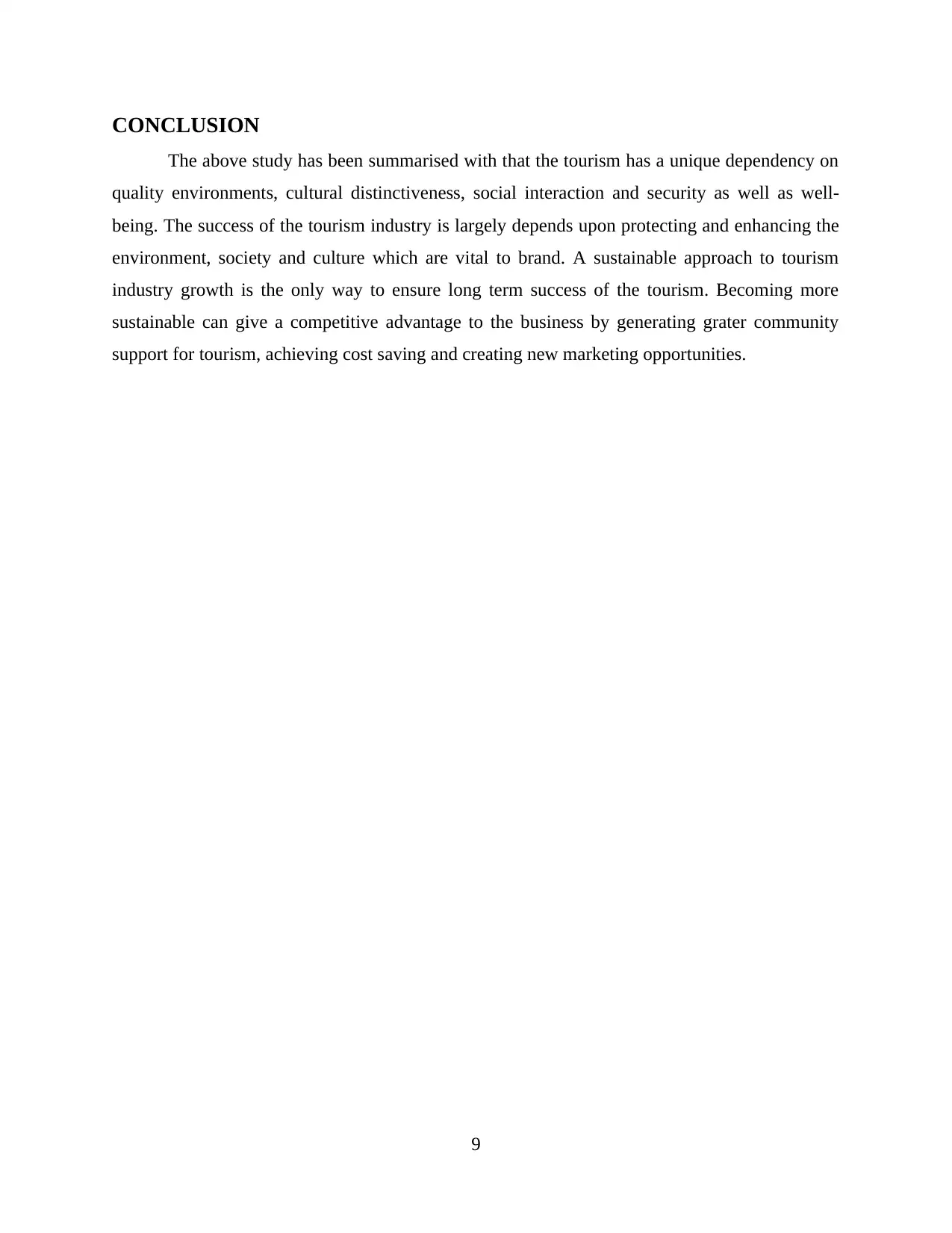
CONCLUSION
The above study has been summarised with that the tourism has a unique dependency on
quality environments, cultural distinctiveness, social interaction and security as well as well-
being. The success of the tourism industry is largely depends upon protecting and enhancing the
environment, society and culture which are vital to brand. A sustainable approach to tourism
industry growth is the only way to ensure long term success of the tourism. Becoming more
sustainable can give a competitive advantage to the business by generating grater community
support for tourism, achieving cost saving and creating new marketing opportunities.
9
The above study has been summarised with that the tourism has a unique dependency on
quality environments, cultural distinctiveness, social interaction and security as well as well-
being. The success of the tourism industry is largely depends upon protecting and enhancing the
environment, society and culture which are vital to brand. A sustainable approach to tourism
industry growth is the only way to ensure long term success of the tourism. Becoming more
sustainable can give a competitive advantage to the business by generating grater community
support for tourism, achieving cost saving and creating new marketing opportunities.
9
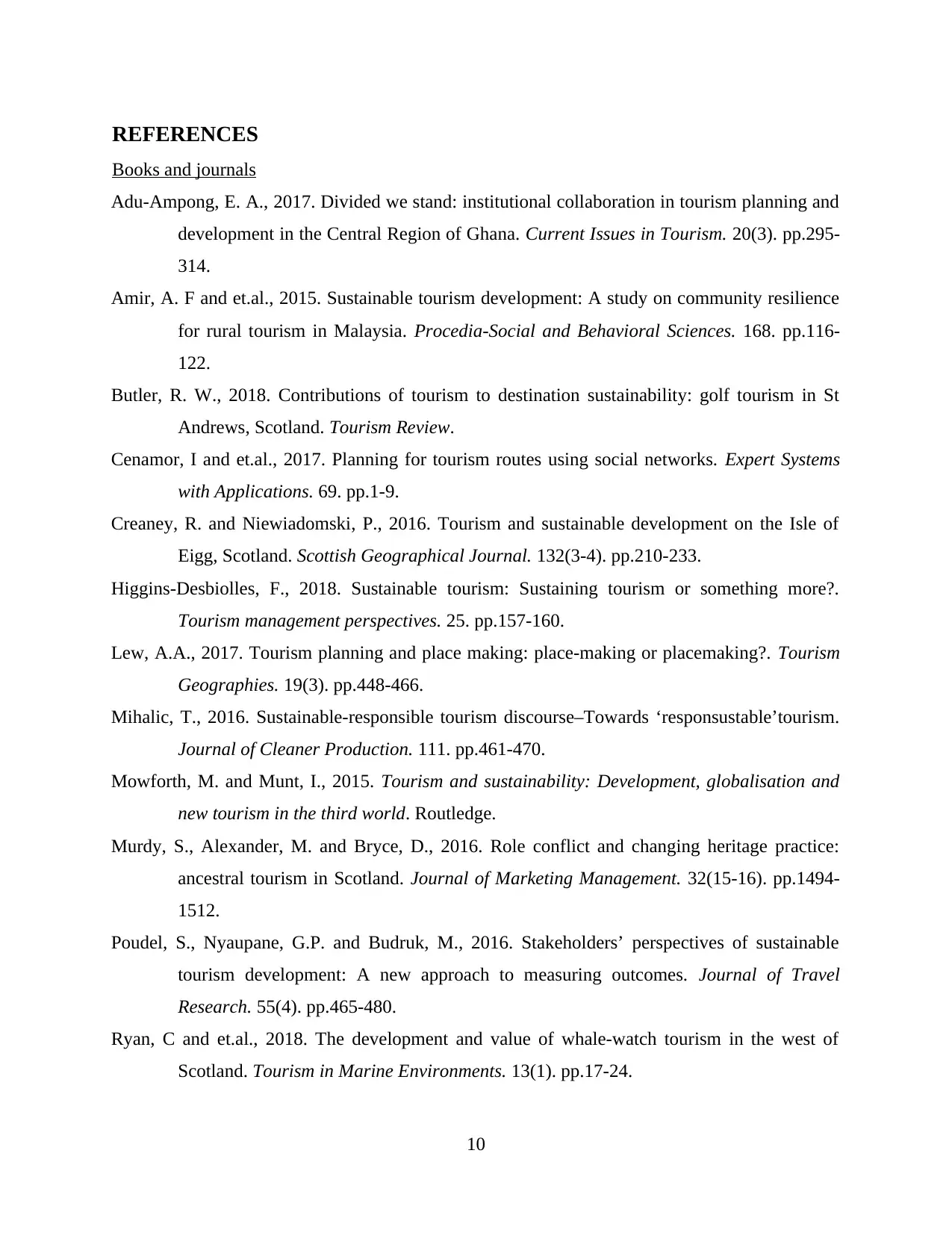
REFERENCES
Books and journals
Adu-Ampong, E. A., 2017. Divided we stand: institutional collaboration in tourism planning and
development in the Central Region of Ghana. Current Issues in Tourism. 20(3). pp.295-
314.
Amir, A. F and et.al., 2015. Sustainable tourism development: A study on community resilience
for rural tourism in Malaysia. Procedia-Social and Behavioral Sciences. 168. pp.116-
122.
Butler, R. W., 2018. Contributions of tourism to destination sustainability: golf tourism in St
Andrews, Scotland. Tourism Review.
Cenamor, I and et.al., 2017. Planning for tourism routes using social networks. Expert Systems
with Applications. 69. pp.1-9.
Creaney, R. and Niewiadomski, P., 2016. Tourism and sustainable development on the Isle of
Eigg, Scotland. Scottish Geographical Journal. 132(3-4). pp.210-233.
Higgins-Desbiolles, F., 2018. Sustainable tourism: Sustaining tourism or something more?.
Tourism management perspectives. 25. pp.157-160.
Lew, A.A., 2017. Tourism planning and place making: place-making or placemaking?. Tourism
Geographies. 19(3). pp.448-466.
Mihalic, T., 2016. Sustainable-responsible tourism discourse–Towards ‘responsustable’tourism.
Journal of Cleaner Production. 111. pp.461-470.
Mowforth, M. and Munt, I., 2015. Tourism and sustainability: Development, globalisation and
new tourism in the third world. Routledge.
Murdy, S., Alexander, M. and Bryce, D., 2016. Role conflict and changing heritage practice:
ancestral tourism in Scotland. Journal of Marketing Management. 32(15-16). pp.1494-
1512.
Poudel, S., Nyaupane, G.P. and Budruk, M., 2016. Stakeholders’ perspectives of sustainable
tourism development: A new approach to measuring outcomes. Journal of Travel
Research. 55(4). pp.465-480.
Ryan, C and et.al., 2018. The development and value of whale-watch tourism in the west of
Scotland. Tourism in Marine Environments. 13(1). pp.17-24.
10
Books and journals
Adu-Ampong, E. A., 2017. Divided we stand: institutional collaboration in tourism planning and
development in the Central Region of Ghana. Current Issues in Tourism. 20(3). pp.295-
314.
Amir, A. F and et.al., 2015. Sustainable tourism development: A study on community resilience
for rural tourism in Malaysia. Procedia-Social and Behavioral Sciences. 168. pp.116-
122.
Butler, R. W., 2018. Contributions of tourism to destination sustainability: golf tourism in St
Andrews, Scotland. Tourism Review.
Cenamor, I and et.al., 2017. Planning for tourism routes using social networks. Expert Systems
with Applications. 69. pp.1-9.
Creaney, R. and Niewiadomski, P., 2016. Tourism and sustainable development on the Isle of
Eigg, Scotland. Scottish Geographical Journal. 132(3-4). pp.210-233.
Higgins-Desbiolles, F., 2018. Sustainable tourism: Sustaining tourism or something more?.
Tourism management perspectives. 25. pp.157-160.
Lew, A.A., 2017. Tourism planning and place making: place-making or placemaking?. Tourism
Geographies. 19(3). pp.448-466.
Mihalic, T., 2016. Sustainable-responsible tourism discourse–Towards ‘responsustable’tourism.
Journal of Cleaner Production. 111. pp.461-470.
Mowforth, M. and Munt, I., 2015. Tourism and sustainability: Development, globalisation and
new tourism in the third world. Routledge.
Murdy, S., Alexander, M. and Bryce, D., 2016. Role conflict and changing heritage practice:
ancestral tourism in Scotland. Journal of Marketing Management. 32(15-16). pp.1494-
1512.
Poudel, S., Nyaupane, G.P. and Budruk, M., 2016. Stakeholders’ perspectives of sustainable
tourism development: A new approach to measuring outcomes. Journal of Travel
Research. 55(4). pp.465-480.
Ryan, C and et.al., 2018. The development and value of whale-watch tourism in the west of
Scotland. Tourism in Marine Environments. 13(1). pp.17-24.
10
Secure Best Marks with AI Grader
Need help grading? Try our AI Grader for instant feedback on your assignments.

Todd, L., Leask, A. and Ensor, J., 2017. Understanding primary stakeholders' multiple roles in
hallmark event tourism management. Tourism management. 59. pp.494-509.
11
hallmark event tourism management. Tourism management. 59. pp.494-509.
11
1 out of 14
![[object Object]](/_next/static/media/star-bottom.7253800d.svg)





